How to Outsource Mobile App Development in Singapore (2026)
Singapore’s digital economy is growing at record speed, making high-quality mobile apps essential for customer engagement and business expansion. But hiring developers locally has become increasingly challenging — Singapore engineers earn 2–3× higher salaries than their counterparts in Vietnam, with average rates of $55–65/hour compared to Vietnam’s $25–35/hour. Combined with intense competition for senior talent and long hiring cycles, many companies struggle to build teams quickly enough to meet market demands.
As a result, mobile app development outsourcing has become a strategic solution for Singapore businesses looking to build world-class apps faster, more efficiently, and at significantly lower cost. The key, however, is knowing how to outsource mobile app development the right way — from defining requirements and choosing the right model to evaluating vendors and ensuring security.
This guide walks you through a clear, step-by-step framework tailored for Singapore companies, helping you make confident decisions and achieve a smooth, successful outsourcing experience.
Table of Contents
- Why Singapore Businesses Are Turning to Mobile App Development Outsourcing
- What Is Mobile App Development Outsourcing?
- Popular Outsourcing Models for Singapore Companies
- How to Outsource Mobile App Development (Singapore Edition)
- Step 1 – Define Your App Requirements Clearly
- Step 2 – Choose the Right Outsourcing Model
- Step 3 – Shortlist Vendors Based on Expertise & Domain Fit
- Step 4 – Evaluate Communication, PM Tools & Documentation Quality
- Step 5 – Request a Mini POC or Technical Interview
- Step 6 – Align on Security, IP Protection & Maintenance Plan
- Step 7 – Kick Off with a Clear Roadmap & Weekly Sprints
- Key Benefits of Outsourcing Mobile App Development (for Singapore Companies)
- How Much Does It Cost to Outsource Mobile App Development?
- What to Consider Before Choosing an Outsourcing Partner
- Common Challenges & How to Mitigate Risks
- Best Practices for Successful Offshore App Development
- 10 Mobile App Development Outsourcing Companies in Singapore
- Kaopiz – Your Trusted Mobile App Development Outsourcing Partner
- Conclusion
- FAQs
Why Singapore Businesses Are Turning to Mobile App Development Outsourcing
As Singapore’s digital landscape accelerates, businesses are under pressure to deliver mobile apps faster than ever while managing rising development costs and talent shortages. These challenges are driving companies to turn to mobile app development outsourcing as a strategic, scalable way to stay competitive.
Market Trends & Rising Demand in Singapore (2025–2030)
Singapore’s digital-first economy is driving unprecedented demand for high-quality mobile applications across industries—from fintech and healthcare to logistics and e-commerce. The Application Outsourcing market is projected to reach $1.02 billion in 2025, with a steady 0.74% annual growth rate through 2030, reaching $1.06 billion.

This growth reflects a strong shift toward cloud-native apps, AI-powered features, and cross-platform development as businesses accelerate digital transformation and prioritize mobile as a core channel for customer engagement.
Cost Pressures & Tech Talent Shortage in Singapore
While demand for mobile apps is rising, Singapore faces significant constraints in tech manpower. Local developer salaries continue to climb, competition for senior engineers is intense, and hiring cycles can stretch for weeks or even months. This talent shortage puts pressure on companies to increase wages, expand hiring budgets, and accept longer time-to-market.
For many businesses—especially SMEs and startups—building a fully in-house mobile team has become financially unsustainable, pushing them to explore outsourcing as a more practical and scalable alternative.
Outsourcing as a Strategic Growth Lever
Outsourcing mobile app development is no longer just a cost-saving solution—it has become a strategic enabler for Singapore businesses. By partnering with offshore teams, companies gain immediate access to specialized talent, faster development cycles, and the ability to scale without long-term headcount commitments.
This flexibility allows organizations to launch features quickly, experiment with new technologies, and redirect internal resources toward product strategy and core operations. In a competitive market like Singapore, outsourcing is increasingly viewed as a way to accelerate innovation while maintaining agility and cost efficiency.
What Is Mobile App Development Outsourcing?
Mobile app development outsourcing refers to the practice of hiring an external software team to design, build, test, and maintain your mobile application. Instead of assembling an in-house development team—which requires long recruitment cycles, high salaries, and ongoing training—businesses collaborate with experienced outsourcing partners who already possess the required technical skills, processes, and resources.
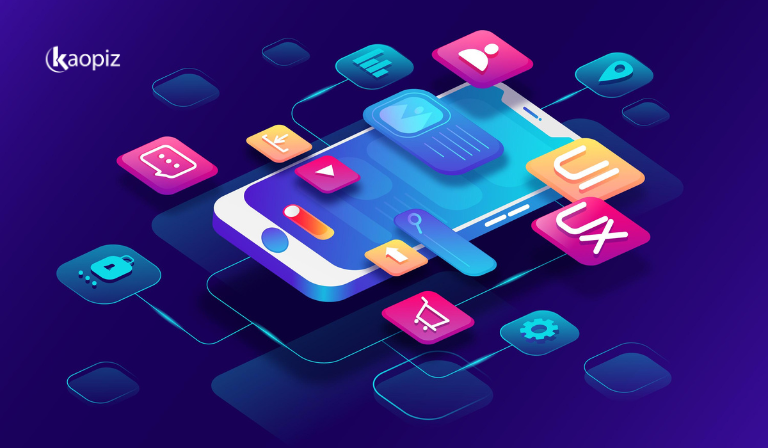
The scope of outsourcing typically covers the full development lifecycle, including:
- Ideation, user research, and requirements analysis
- UI/UX design
- iOS, Android, or cross-platform development
- Backend development and cloud integration
- Quality assurance and automated testing
- Deployment to App Store / Google Play
- Maintenance, updates, and feature expansion
This approach allows companies to accelerate delivery, control budgets, and stay focused on product strategy instead of operational overhead.
Popular Outsourcing Models for Singapore Companies
Singapore businesses typically adopt one of three outsourcing models depending on project complexity, budget flexibility, and level of involvement required:
| Model | Best For | Key Advantages | Limitations |
|---|---|---|---|
| Fixed Price | Projects with clear, stable requirements | Predictable budget; minimal day-to-day management; ideal for MVPs or small apps | Low flexibility if requirements change mid-project |
| Time & Materials (T&M) | Evolving projects, R&D, continuous feature updates | High flexibility; pay only for actual hours; transparent workload tracking | Total cost varies based on duration and scope changes |
| Dedicated Team / ODC | Long-term, complex, or multi-year product development | Full control; deep collaboration; fast iteration; scalable team | Requires more involvement in planning and prioritization |
How to Outsource Mobile App Development (Singapore Edition)
Outsourcing mobile app development can deliver speed, flexibility, and significant cost advantages — but only when executed with a clear, structured approach. Below is a step-by-step framework tailored specifically for Singapore businesses to ensure a smooth and successful outsourcing experience.
Step 1 – Define Your App Requirements Clearly
Successful outsourcing always starts with clarity. Before speaking to any vendor, you should have a well-defined picture of your app: the core features, user journeys, and the problems you’re trying to solve.
Consider which platforms you’re targeting (iOS, Android, or cross-platform), how PDPA may influence your data flow, and what third-party services — such as Stripe, PayNow, or Singpass — your app may need to integrate with. When your requirements are clear from the start, vendors can estimate properly, risks are lower, and the development process becomes far smoother.
Step 2 – Choose the Right Outsourcing Model
Different projects call for different models, and choosing the wrong one is one of the most common mistakes companies make. Fixed Price works best when your scope is stable, and your MVP is clearly defined. Time & Materials offers more flexibility if your feature set is likely to evolve or you want to iterate based on user feedback.
Meanwhile, a Dedicated Team — often called an Offshore Development Centre (ODC) — is ideal for long-term or multi-year products because it gives you more control and continuity. Many Singapore companies today use a hybrid approach: Fixed Price for the MVP, then a Dedicated Team for feature expansion.
Step 3 – Shortlist Vendors Based on Expertise & Domain Fit
The vendor you choose should not only be technically strong, but also relevant to your domain. Experience building fintech, healthcare, education, logistics, or commerce apps matters because each has unique workflows and compliance requirements.
Look closely at their past projects, download and test their apps, and assess the quality of their UI/UX, architecture, and performance. If they’ve worked with Singapore or APAC clients before — or understand PDPA, MAS-related requirements— that’s a significant advantage. A domain-fit vendor reduces friction and accelerates the discovery phase dramatically.
Step 4 – Evaluate Communication, PM Tools & Documentation Quality
Great outsourcing partnerships succeed because of great communication. Make sure your vendor uses structured delivery processes such as Agile or Scrum, and platforms like Jira, ClickUp, or Confluence to track progress and maintain documentation.
Weekly check-ins, sprint demos, and clear release notes help you stay aligned, even when the team is offshore. The more transparent their workflow is, the easier it will be for you to manage priorities and monitor progress.
Step 5 – Request a Mini POC or Technical Interview
Before committing long-term, always validate the team’s actual capabilities. A small proof-of-concept — such as a simple feature, a core screen, or a small API integration — can reveal a lot about how the team writes code, interprets requirements, and handles feedback.
A short technical interview or a review of their previous codebase also gives you valuable insights into their engineering maturity. This step alone can save you from choosing a vendor who looks good on paper but cannot deliver in practice.
Step 6 – Align on Security, IP Protection & Maintenance Plan
Security is especially important for Singapore companies. Confirm that the vendor understands PDPA and follows strong data protection practices. If they have ISO 27001 certification, it’s a strong sign of maturity.
You should also clarify code ownership from day one — including repository access, NDA terms, and IP transfer rights. Finally, discuss how the partner will handle post-launch maintenance, such as OS updates, bug fixes, and feature enhancements. Proper alignment here ensures long-term reliability and avoids unpleasant surprises after launch.
Step 7 – Kick Off with a Clear Roadmap & Weekly Sprints
Once you select your vendor, start with a structured kickoff. Agree on a roadmap that breaks down milestones and timelines, so everyone understands what will be delivered and when.
Running development in weekly or bi-weekly sprints helps maintain momentum and prevents misalignment. Regular reviews and demos give you continuous visibility into progress and help you course-correct early if needed. A strong sprint rhythm is what ultimately keeps your app on track and accelerates your time-to-market.
Key Benefits of Outsourcing Mobile App Development (for Singapore Companies)
Outsourcing mobile app development offers far more than cost reduction — it provides strategic advantages that help Singapore businesses innovate faster and scale smarter. Below are the core mobile app development outsourcing benefits.
Major Cost Savings (Save 40–60% Compared to Local Development)
Outsourcing helps Singapore companies cut development costs significantly because local developer salaries are 2–3× higher than those of offshore engineers in Vietnam and Southeast Asia. Offshore rates typically sit around $25–40/hour, while Singapore developers often charge $55–90/hour, creating a substantial cost gap. Industry data also shows total project savings of 40–60% when businesses outsource instead of hiring locally.

These savings let companies reallocate budget toward UI/UX improvements, feature expansion, and customer acquisition instead of payroll. For SMEs and startups, especially, outsourcing enables them to build high-quality mobile apps without sacrificing runway or delaying launch timelines.
Faster Time-to-Market (Cut Hiring & Delivery Time by 30–50%)
Hiring mobile engineers in Singapore can take 6–12 weeks due to intense competition and high salary expectations, slowing product development. Outsourcing solves this by giving businesses access to ready-built offshore teams that can start within 7–14 days. Research also shows outsourced Agile teams deliver MVPs 30–50% faster than in-house teams ramping up from scratch.
This time advantage helps companies test ideas sooner, gather user insights earlier, and launch before competitors—especially important in fast-moving industries like fintech, logistics, and ecommerce.
Access to Cross-Platform, Cloud & Mobile Specialists
Outsourcing partners bring deep expertise across modern technologies such as Flutter, React Native, Swift, Kotlin, Firebase, and AWS. Instead of hiring multiple niche specialists, Singapore companies gain immediate access to full-stack teams who understand cross-platform development, cloud integration, security, and performance optimization — all essential for today’s mobile-first products.
Flexibility & Scalability
Outsourcing offers the ability to scale development resources up or down based on project needs. Singapore companies can expand their team during peak development phases and reduce capacity during quieter periods. This flexibility is difficult to achieve with an in-house team and allows businesses to maintain agility without long-term hiring commitments.
Focus on Core Business Instead of Managing Developers
By delegating design, coding, testing, and maintenance to an experienced outsourcing team, businesses can concentrate on strategy, customer experience, and revenue-driving initiatives. Outsourcing reduces operational overhead and frees internal teams from the daily complexities of software development — enabling leaders to prioritize growth and innovation.
How Much Does It Cost to Outsource Mobile App Development?
The cost of outsourcing mobile app development typically ranges from SGD 90,000–150,000 for a mid-sized 6-month project when working with offshore teams in Vietnam, compared to SGD 250,000–380,000 if fully developed in Singapore.
While prices vary by region, scope, and technology, the following breakdown gives Singapore businesses a clear view of what to expect.
Cost Comparison – Singapore vs Offshore (Vietnam)
The cost difference between hiring mobile app developers in Singapore versus outsourcing to Vietnam is one of the biggest reasons businesses choose the offshore model.
Singapore developers often charge $55–90/hour, while offshore engineers in Vietnam cost $25–40/hour, resulting in 40–60% overall savings without sacrificing quality.
Here is the cost comparison table between Singapore vs Vietnam (2026):
| Cost Component | Singapore (Local Hiring) | Vietnam (Offshore Outsourcing) | Notes |
|---|---|---|---|
| Mobile Developer Salary | SGD 7,000–12,000/month | SGD 2,500–4,500/month | Vietnam offers 50–70% savings for similar skill levels |
| Senior Developer / Tech Lead | SGD 12,000–18,000/month | SGD 4,500–7,500/month | Offshore leads often manage cross-functional teams |
| UI/UX Designer | SGD 5,000–9,000/month | SGD 1,800–3,500/month | Creative and product UI talent widely available in Vietnam |
| QA Engineer | SGD 4,500–7,500/month | SGD 1,500–3,000/month | Offshore QA teams operate in Agile cycles with automation |
| Project Manager / Scrum Master | SGD 10,000–14,000/month | SGD 3,000–5,500/month | Many PMs and BrSEs in Vietnam are English/Japanese bilingual |
| Hiring Time | 4–12 weeks | 7–14 days | Offshore teams are pre-built and ready to onboard |
| Infrastructure & Tools | Additional cost | Included in outsourcing fee | Offshore vendors cover licenses, equipment, and management tools |
| Total Project Cost (6-month app) | SGD 250,000–380,000 | SGD 90,000–150,000 | 40–60% overall cost reduction |
Key Takeaways:
- Vietnam delivers significant cost savings while maintaining strong technical standards.
- Offshore teams reduce recruitment delays, allowing you to start development immediately.
- Total cost of ownership (TCO) is much lower because infrastructure, management, and QA are included.
- Savings can be reinvested into product features, marketing, or scaling other digital initiatives.
Why Vietnam Is a Top Offshore Destination for Singapore
Vietnam IT outsourcing offers a powerful mix of cost efficiency, strong engineering talent, and close regional alignment — making it one of Singapore’s most trusted destinations.
- 40–60% lower development costs compared to Singapore, without compromising quality.
- Skilled mobile engineers experienced in Flutter, React Native, Swift, Kotlin, AWS, and Firebase.
- Only 1-hour time difference, enabling smooth real-time collaboration.
- High English proficiency, with many teams supported by bilingual PMs and BrSEs.
- Familiar with Singapore’s delivery expectations, security standards, and fast-paced workflows.
- Rapidly growing tech ecosystem, backed by strong STEM education and government investment.
What to Consider Before Choosing an Outsourcing Partner
Choosing the right outsourcing software development partner is crucial to the success of your mobile app project. Before you commit, make sure the vendor meets the following essential criteria to ensure quality, security, and long-term reliability.

- Technical Expertise across iOS, Android, Flutter, React Native: Ensure your partner has strong capabilities in the mobile frameworks and platforms you need, with clean coding practices and a solid track record.
- Domain Knowledge (Fintech, Healthcare, Logistics, Education…): Vendors with industry experience understand regulations, user expectations, and workflows — reducing rework and speeding up delivery.
- Documentation & Transparency: Choose teams that provide clear requirements, sprint updates, and release documentation to keep communication consistent and aligned.
- QA Process, Security & Compliance: Verify that the partner follows structured QA processes and complies with essential standards like PDPA and ISO 27001.
- Post-Launch Support & Warranty: A good outsourcing team offers maintenance, bug fixing, and ongoing support to keep your app secure and up to date post-release.
Common Challenges & How to Mitigate Risks
Outsourcing offers huge advantages, but it also comes with risks that businesses must manage proactively. Understanding these common outsourcing problems and challenges will help Singapore companies avoid costly pitfalls and maintain full control throughout the development process.
| Common Risk | Impact on Project | How to Mitigate |
|---|---|---|
| Miscommunication & Time Zone Issues | Delays, misaligned expectations | Use Agile ceremonies, shared documentation, and overlapping working hours |
| Quality Mismatch (Design, UX, Code) | Poor user experience, rework | Request POC, review portfolios, define coding/design standards |
| Security & Data Privacy Concerns | Data breaches, non-compliance with PDPA | Ensure PDPA + ISO 27001 compliance, control access, secure repos |
| Vendor Lock-In & IP Ownership Issues | Difficulty switching vendors, long-term dependency | Define IP ownership clearly, require full source code access from day one |
Best Practices for Successful Offshore App Development
To make your offshore mobile app development outsourcing project a success, focus on clarity, communication, and collaboration from day one.
- Set Clear Goals: Define your project objectives, features, and KPIs early. A shared understanding helps your offshore team deliver on your business vision.
- Choose the Right Partner: Evaluate potential partners for proven expertise, certifications, and project history. Companies like Kaopiz combine technical excellence with global delivery standards.
- Communicate Frequently: Maintain consistent communication through Agile sprints and weekly updates. Use tools like Slack or Jira to stay aligned across time zones.
- Prioritize Quality and Security: Integrate testing at every stage and ensure your partner follows strict data protection practices such as ISO 27001.
- Build Long-Term Collaboration: Treat outsourcing as a partnership, not a transaction. Continuous cooperation leads to faster delivery, smoother workflows, and scalable results.
10 Mobile App Development Outsourcing Companies in Singapore
For Singapore businesses exploring mobile app development outsourcing, choosing the right partner can make or break your project. Therefore, the mobile app development companies below are among the most established and reliable providers in Singapore, offering mobile app development, UI/UX, backend engineering, dedicated teams, and end-to-end outsourcing services.
| # | Company | Services | Key Strengths | Best For |
|---|---|---|---|---|
| 1 | TechTIQ Solutions | Mobile & web apps, IT staffing, digital transformation | Strong Singapore PM/QA team + Vietnamese dev pool, ISO 27001 mention | Enterprises or mid-sized firms needing agile outsourcing with oversight |
| 2 | Kaopiz | Mobile app dev (iOS, Android, cross-platform), web apps, staff augmentation | Offshore cost advantage + broad tech stack + long experience (since 2014) | Singapore enterprises or mid-sized firms seeking cost-effective offshore partner |
| 3 | Singsys | Custom mobile app dev (iOS/Android/cross), enterprise focus | Established Singapore presence, trusted with enterprise & e-commerce apps | Mid-to-large companies needing full service |
| 4 | SleekDigital | Mobile-first digital solutions (logistics, ecommerce, education) | Startup/SME friendly, strong digital focus | SMEs looking for fast MVPs & strong UX |
| 5 | Buuuk | Premium mobile app design & dev studio (retail, transport, gov) | High-design focus + enterprise-grade solutions | Brands & enterprises wanting high-end UI/UX |
| 6 | Codigo | Mobile development, digital product design, agile delivery | Design-centric + cross-platform expertise | Companies where UX/UI is the key differentiator |
| 7 | Rainmaker Labs | Enterprise mobility, long-term maintenance, scalable apps | Enterprise-grade, suitable for long-term roadmaps | Large organizations with ongoing app development needs |
| 8 | Originally US | End-to-end mobile dev, UX research, app audits | Research-driven + strong UX foundation | Apps needing strong user research or brand focus |
| 9 | Titansoft | Product dev outsourcing, agile engineering, cross-platform | Singapore–Taiwan hybrid model, dedicated teams | Companies needing a dedicated offshore engineering team |
| 10 | Swag Soft | Mobile app dev, AR/VR, gamified/interactive apps | Specialists in AR/VR and experimental experiences | Companies building gamified or highly interactive apps |
Kaopiz – Your Trusted Mobile App Development Outsourcing Partner
Founded in 2014, Kaopiz is a leading app making company headquartered in Hanoi, Vietnam. With over 600 engineers and a decade of experience, Kaopiz delivers world-class software and mobile app solutions for clients in Japan, Singapore, Europe, and North America.
Kaopiz’s Expertise in Mobile App Development
Kaopiz delivers full-cycle mobile app development — from ideation and design to coding, testing, and post-launch support. Our engineers specialize in:
- Native app development: Kotlin (Android) and Swift (iOS)
- Cross-platform development: Flutter and React Native
- Backend & cloud integration: Firebase, AWS, and Google Cloud
Moreover, Kaopiz has successfully built mobile applications across industries, including Fintech, Healthcare, Education, E-commerce, and Logistics.
What Sets Kaopiz Apart
At Kaopiz, we do more than deliver technology — we build partnerships that drive long-term success. Our approach combines technical excellence, transparent collaboration, and a deep commitment to our clients’ growth. Here’s what makes us different:
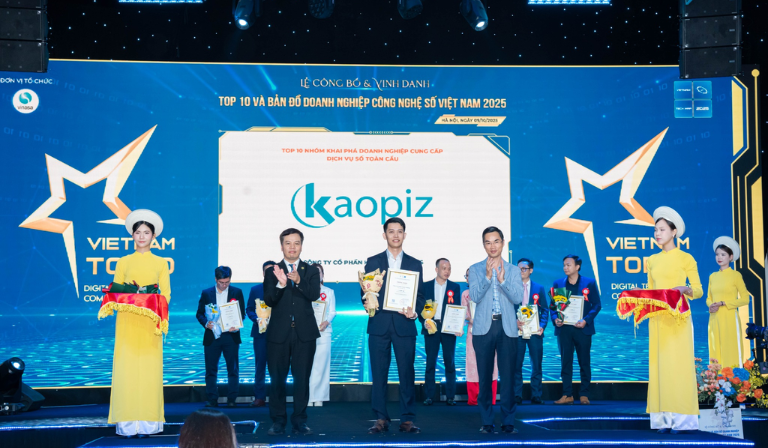
- Proven Global Expertise: With over a decade of experience and more than 1,000 successful projects, we’ve earned the trust of clients across Japan, Singapore, Europe, and North America. Our teams understand diverse markets and deliver solutions that meet global standards in both quality and performance.
- Certified Quality and Security: We are proud to be ISO 9001 and ISO 27001 certified, reflecting our dedication to quality management and data protection. Every project we handle follows a structured process to ensure reliability, consistency, and complete client confidentiality.
- Agile and Transparent Delivery: We follow Agile and Scrum methodologies to keep development flexible and transparent. Our clients stay informed at every stage through regular progress updates, sprint reviews, and open communication channels — ensuring your vision stays at the heart of every milestone.
- Multilingual Communication: Our engineers and Bridge System Engineers (BrSEs) are fluent in English and Japanese, enabling seamless collaboration with clients around the world. We value clear communication as the foundation of successful outsourcing partnerships.
- Skilled and Scalable Talent Pool: With a team of over 600 engineers and specialists, we bring deep expertise in mobile, web, AI, and blockchain development. We can easily scale teams to match your project’s scope — ensuring both speed and quality in delivery.
- Long-Term Partnership Mindset: We believe outsourcing should feel like collaboration. Our goal is to become an extension of your team — working side by side to innovate, solve problems, and help your business grow sustainably.
Conclusion
Outsourcing mobile app development gives Singapore businesses a faster, more cost-effective way to build high-quality digital products. With the right partner and a clear outsourcing framework, companies can reduce risks, speed up delivery, and focus on growth instead of managing development overhead.
If you’re planning to outsource your next mobile project, connect with Kaopiz — a trusted Vietnamese IT outsourcing company that combines talent, technology, and trust to bring your vision to life.
FAQs
- What Is Mobile App Development Outsourcing?
- It’s the process of hiring an external company to build and maintain your mobile apps instead of managing development in-house.
- Why Outsource App Development to Vietnam?
- Vietnam offers competitive pricing, a strong engineering workforce, and bilingual communication for global clients.
- What Technologies Does Kaopiz Use for Mobile Apps?
- Kaopiz develops with Flutter, React Native, Kotlin, Swift, Firebase, AWS, and other modern technologies.
- How Much Does It Cost to Outsource App Development from Singapore?
- Outsourcing typically costs SGD 90,000–150,000 for a mid-complexity app when working with offshore teams — far lower than the SGD 250,000–380,000 required for local development.
- How Long Does It Take?
- Most outsourced mobile apps take 3–6 months to build, with simple MVPs delivered in 8–12 weeks and larger projects requiring up to 6–12 months.
One Reply to “How to Outsource Mobile App Development in Singapore (2026)”
Leave a Comment
Trending Post
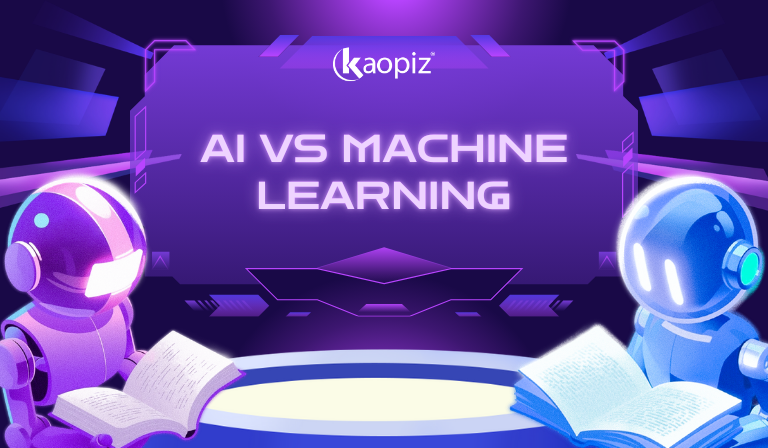
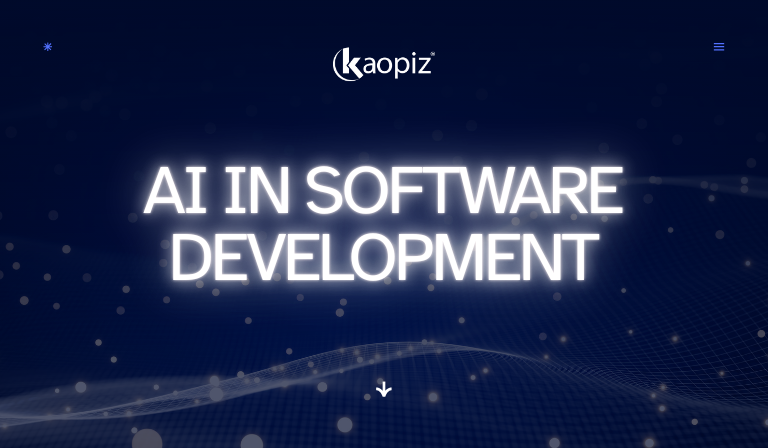
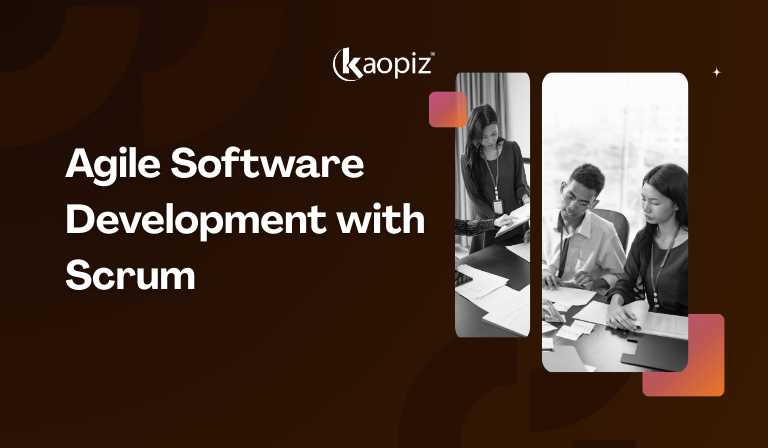


















Pingback:Top 10 Software Development Trends 2025 Businesses Must Know